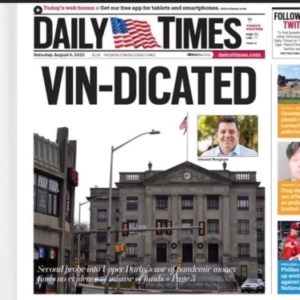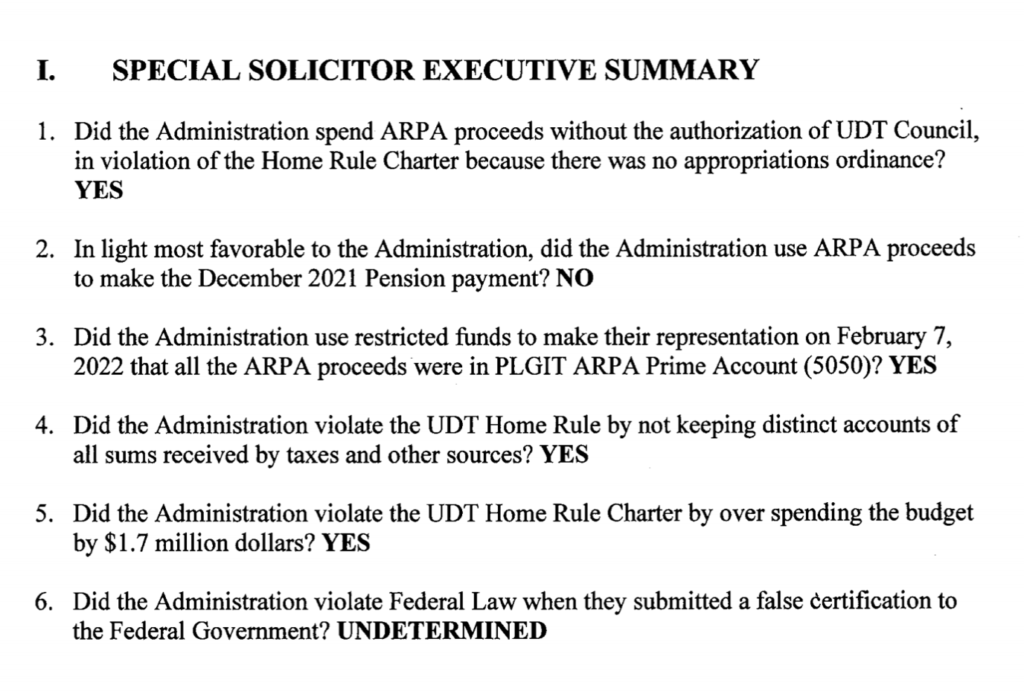Con-VINCE-ing data: Investigator says federal funds were spent without UD council approval, violating home-rule charter
Results of a long-awaited financial investigation into Upper Darby’s finances were delivered to the township council Wednesday night, concluding that federal funds from the American Rescue Plan Act (ARPA) were spent without the approval of the township council in violation of the home rule charter.
The 24-page report from special solicitor Chris Boggs also said that Mayor Barbarann Keffer’s administration used restricted funds to make it appear to the town council that all ARPA funds were accounted for, and also violated the charter at least two other times by going over budget in 2021 by $1.7 million dollars, as well as not keeping distinct accounts for certain kinds of funds.
The administration is pushing back on nearly all the claims made in the Boggs report, and are highlighting a nickname originating from “the community” — calling the three Democrats and three Republicans who have been at odds with Keffer “the ‘white power six’ or simply the ‘shameful six.’”
Democratic members of the council and citizens in the chamber supporting the Keffer administration said the findings were an about-face from an earlier but unfinished update from Boggs delivered to the council’s finance committee in August. Even though Boggs said that update was not intended to be a real report in any fashion, Councilmember Andrew Hayman, one of the group of five Democratic members continuing to back Keffer, seized upon an email of the update and “leaked” it to the press, according to the Delco Daily Times.
That group characterized the incomplete report as proof that the administration had been above reproach, and that the bipartisan group of six councilmembers who authorized the investigation were continuing to grind a political axe.
The Daily Times went so far as to headline its story on the August update from Boggs as “VIN-dicated,” playing off the name of Keffer’s chief administrative officer, Vincent Rongione, the center of the controversy.

However, Boggs had warned at the time that the conclusions being reached from the email were not fully warranted, and that his own final conclusions were still in the making.
To the administration’s credit, the Boggs report said when using the most favorable angle possible, Keffer’s administration did not use ARPA funds to make a required pension payment in December 2021, something Boggs had held out as a possibility in August.
He also said it was possible, but remained undetermined, whether the administration submitted a false certification to the federal government about having spent any of the ARPA funds. Boggs said he could not reach a conclusion about that without seeing an attachment that was also sent simultaneously with the certification.

Tracing the financials across several accounts, Boggs showed how the original $20.8 million in APRA funds was deposited into a general Pennsylvania local government investment trust account, also called a PLGIT account.
After that deposit was registered, the PLGIT account had a total balance of $42.49 million.
Some normal drawdowns were made against the account through the fall.
In December, however, a $12 million dollar withdrawal occurred, leaving the account with a balance about $6 million lower than the original deposit of the $20.8 million of ARPA funds.
Boggs asserted the ARPA funds were now split into two parts: the roughly $14 million that remained in the PLGIT account, and the $6 million that had been withdrawn.
The $6 million that had been moved was in a general fund account being used for daily business. Boggs said about $4.2 million of that money was spent to write “311 checks, one full payroll, and one-half a payroll,” he told the council.
“Within those 311 checks, that is an exhibit [provided to counsel], you can see every single person, entity, vendor, that was paid with ARPA money,” Boggs said. “And that is the most absolute, conservative way to look at [what happened] in the month of December.”
Boggs said eventually the administration tried to cobble together the original $20.8 million into a single, segregated account that was newly created, and demonstrably labeled “ARPA.” In order to cover the money that had been spent through the checks and payroll, however, Rongione transferred money out of some restricted accounts, Boggs asserted.
As the name “restricted suggests, these accounts are segregated for specific purposes, and because the jurisdiction over those monies are sometimes shared with other governmental entities, the money is not supposed to be moved or spent without certain approvals.
One such account is an asset forfeiture fund managed in combination with the county’s district attorney. Because the account consists of money seized from persons accused of crimes, it is not supposed to be moved without a court order.
In June, Councilwoman Meaghan Wagner made an issue out of this bank account having been “zeroed out.” But Rongione countered by saying that the money was simply being moved to a new bank for business reasons. However, the township’s administrative code requires a council ordinance before any new depository relationships can be established.
Boggs said bank records showed the administration moved about $370,000 of those confiscated funds into the newly created ARPA fund, along with transfers from a fire escrow account, and an account for state highway issues.
He further said the $370,000 of confiscated funds were returned, to the penny, to the new bank account that had been opened as a new home for these monies.
Boggs said all of these varied movements — but especially the movements of the restricted funds — were evidence that the administration knew it had to be able to say to council that all $20 million of the ARPA funds were accounted for, and in a single location. The administration needed to present this to council on Feb. 7 because it was asking council to approve $6 million in ARPA spending so that the township would not miss an upcoming payroll.
“The most compelling evidence of intentionality here is when the restricted amounts go — other than the highway funds, they do not return — when the restricted amounts go back into the new or old account in the exact amount to the cent,” Boggs told the council. “So, you don’t see that in other parts of this — you don’t see things going back, you don’t see numbers represented to the cent” going back.
“So I would conclude those were intentional acts because whoever was making them knew those funds were restricted, knew that they had to go back.”
The administration is pushing back on virtually every aspect of the Boggs report, even going so far as to inject racial politics into the mix.
“Tonight, the slim majority of Council’s hand-picked investigator has caved to the pressure of the all-white finance committee’s obvious agenda for this partisan, biased investigation,” an press release from the administration says. “While many questioned the back-room appointment of Christopher Boggs, a defense attorney with no documented experience with municipal or financial matters – let alone the intricacies of municipal accounting – from the beginning, it has become painfully clear that his primary qualifications are his long service to the Republican Party and a willingness to deceive the public to achieve a partisan goal.”
For example, the press release argued that the assertion that ARPA funds were spent without council was flatly wrong.
“During their presentation on May 19 of this year, Marcum – a top national CPA (Certified Public Accountant) firm engaged by Mayor Keffer directly – stated that they had performed analyses of the actual bank balances of general fund bank accounts comparing them to the ARP funds from December 1, 2021 through February 7, 2022 and determined that the actual bank balances exceeded the ARP funds at all times,” the release said.
The Marcum report was commissioned by Mayor Keffer, and was published in May. As with the current Boggs report, the findings of the Marcum report have been hotly debated. The report’s major finding said, “At all times the general fund bank account balances exceeded $20.88 million,” implying that no ARPA money had been spent.
The group of six allied against the Mayor have criticized that report, saying it only had access to one of the dozen or so bank accounts that needed to be combed through.
The release then went on to say that those types of refutations eventually undermined the possibility held out by Boggs that an inaccurate representation of how the ARPA money was being used was submitted to the federal government.
The administration is also refuting Boggs’ assertion that monies from restricted funds were used in assembling the $20.8 million into the ARPA fund created in February. In its press release, the administration pointed to four different deposit amounts that went into the ARPA account, none of which matched, for example, the $370,179 from the restricted “confiscated funds” account.
But Upper Darby former finance director Gary Meron says that explanation glosses over what he says is the more granular truth.
“What they neglected to point out was that [one of the contributing accounts] had nowhere near that much money in it. They transferred into that account money from several bank accounts, including four restricted accounts. And then once they had the money accumulated, they transferred the total $3.576 million in one transfer.”
Boggs said that to the extent his investigation may have uncovered any criminal wrongdoing, he provided a copy of his report to the Delaware County district attorney’s office.
Near the conclusion of the meeting, the council voted to put Rongione’s employment up for a third vote of the council at next week’s regularly scheduled council meeting. The vote ran along the same 6-5 lines that have defined this political struggle from the beginning in February.
UPDATE: An earlier version of this story said a press release issued in response to the Boggs report was “unsigned.” It has been changed to say the press release is from “the administration.”
Todd Shepherd is Broad + Liberty’s chief investigative reporter. Send him tips at tshepherd@broadandliberty.com, or use his encrypted email at shepherdreports@protonmail.com. @shepherdreports





A lack of care in the handling of funds – YES. A willful disregard for appropriate checks and balances – MAYBE. Fraud or other criminal level misconduct – NOPE.
That said, carelessness at that level could feed a potential material weakness that could result in future financial misfeasance or malfeasance and should be addressed.